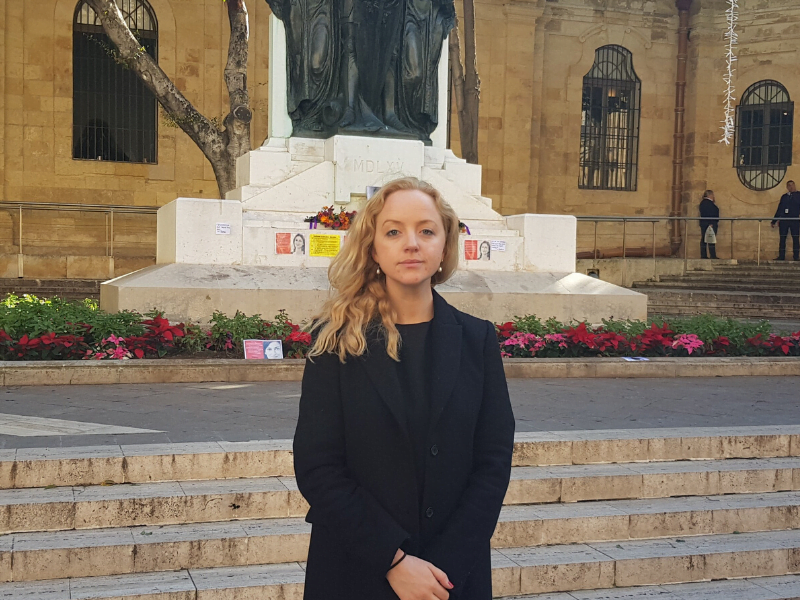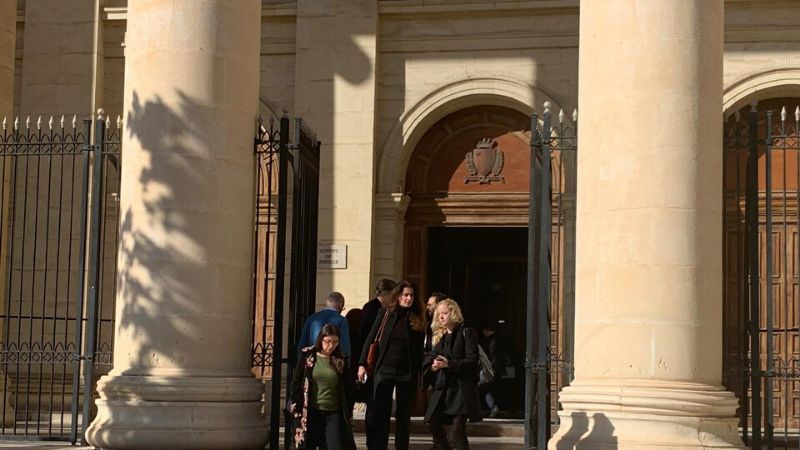Sarah Clarke, Head of Europe and Central Asia for international human rights organisation Article 19, compared Joseph Muscat’s interference with the criminal investigation and public inquiry into the assassination of Daphne Caruana Galizia to the murder of Saudi journalist Jamal Khashoggi.
“This extraordinary situation in Malta bears comparison to the role of Prince Mohammed Bin Salman in the murder of Jamal Kashoggi,” she said, speaking to The Shift outside the law courts in Valletta after the first sitting of the public inquiry into the journalist’s assassination.
“It’s impossible to overstate the concerns we have that Joseph Muscat remains as Prime Minister, with his involvement and executive power over the Police Commissioner and Attorney General. The revelations of the past few weeks demonstrate that the Prime Minister is totally compromised and cannot remain in charge,” Clarke added.
Council of Europe Special Rapporteur Pieter Omtzigt, whose report on the Caruana Galizia assassination and the rule of law in Malta was instrumental in establishing this inquiry, has also renewed his call for Muscat’s resignation, that he made in an interview with The Shift earlier this week.
Omtzigt said Muscat must resign with “immediate effect” after court testimony by middleman Melvin Theuma directly implicated the Office of the Prime Minister, including men connected directly with Muscat, the Rapporteur said in a statement.
“There must be a prompt and effective investigation of the allegations that members of his Office were implicated in the murder and its cover-up. By clinging to office, Muscat risks undermining the investigation and doing yet further damage to Malta’s national institutions and international reputation.”
While Clarke welcomed the opening of the public inquiry and stated her confidence in the terms of reference and composition of the panel, she reiterated the importance of public scrutiny in making sure the full truth comes out.
“We urge full public scrutiny of the inquiry, which is of global significance for the safety of journalists,” she said.
Clarke also raised serious concerns over whether the State will comply with the public inquiry and its obligations to full disclosure and cooperation.

Sarah Clarke, Head of Europe & Central Asia for Article19
On the opening day of testimony, the assassinated journalist’s husband Peter Caruana Galizia referred to the last story she was investigating at the time of her death. “It was the Electrogas contract that killed her,” he said.
The Electrogas deal was facilitated by former Chief of Staff Keith Schembri and Tourism Minister Konrad Mizzi, who was Energy Minister at the time. It involved the alleged mastermind of the assassination, businessman Yorgen Fenech, who owned a Dubai company called 17 Black which was one of two companies set up to funnel kickbacks from the deal to Schembri and Mizzi. The owner of the second company, Macbridge, remains unknown.
Caruana Galizia described how his wife was publicly attacked over the years by citizens, government officials, public employees and Labour Party officials, including damage to her car, being harassed and spat at in public, administrative harassment, attacks on her home, the filing of fake police reports about her, and the 45 libel cases that she faced at the time of her death.
He said this relentless campaign of dehumanisation “made it easy to get rid of her as she was not considered a person any more”.
When asked whether police protection had ever been provided, Caruana Galizia replied that it had been withdrawn when Police Commissioner John Rizzo was removed from his post.
“Rizzo would send police protection day and night at election time and when there were certain issues. Rizzo insisted on that. Whether she wanted it or not, he was sending protection. Rizzo felt she needed it, that she was a person who needed protection,” her husband said.
The journalist’s son Matthew Caruana Galizia also took the stand on Friday, where he accused police of not taking action on Schembri and Mizzi, despite ample evidence of corruption having been presented to them by the Financial Intelligence Analysis Unit (FIAU).
Referring to the alleged mastermind, he said: “If my mother was murdered to prevent her from publishing evidence that was already in the hands of, or that would have eventually come into the hands of, Ian Abdilla and the FIAU, then Fenech must have been absolutely certain that Abdilla would never press charges against him, or even conduct a full investigation, based on that same evidence.”
Her son called for the inquiry to begin by attacking the means of corruption: planning permits, government jobs, judicial appointments and promotions, Board and committee appointments, positions of trust, and government contracts.
“I hope it means that all the perpetrators will be irrevocably removed from public life, be brought to justice and, ideally, have their liberty taken away from them,” he said.
He called on the inquiry to seek a copy of the full Egrant inquiry, and all FIAU reports and police case files on the persons connected to or featuring in the murdered journalist’s main investigations.
The family’s lawyer also requested that the Board seek access to the files from the libel case filed against the journalist by Economy Minister Chris Cardona, including his mobile phone records. This, she said could indicate whether it was a turning point in the increased risk to the journalist and was a matter of utmost urgency.
Her son also called for “full disclosure by the government” in this inquiry, as well as access to the final report, witness statements, documentary evidence, and the ability to present lists of witnesses on an ongoing and continued basis.
“A public inquiry should start automatically and immediately upon the murder of a journalist who is investigating high-level corruption,” he said. “It is not something that the family members of the victim should have to fight for.”
Testimony will be heard from Caruana Galizia’s parents and sisters on 10 December.













